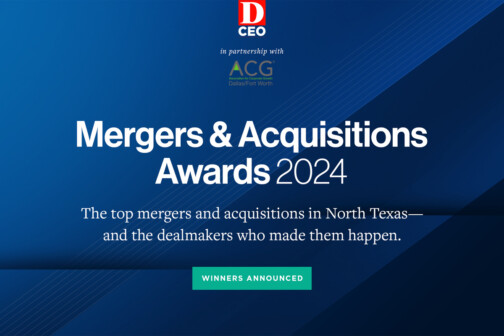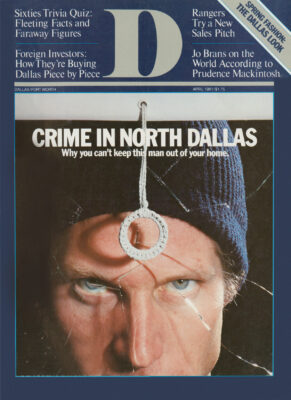THE 48-YEAR-OLD former Marine folded his hands, leaned back with that self-satisfied “a man’s gotta do what a man’s gotta do” look in his eyes, and said, “Barbie is going to be 23 this year.”
Then he implied he’d fostered a special fondness for Barbie since she was about six, and the brutal truth is that the relationship was anything but platonic. He used to sell her body.
The person making these startling admissions was none other than Sam Mea-son, who recently took charge of the marketing and business affairs of the Texas Rangers baseball team on behalf of the owner, a product of the oil patch named Mad Eddie.
It must be mentioned that Meason is former president and chief operating officer at Mattel Toys, Inc., which explains his Barbie doll fixation.
Meason resigned from Mattel, he says, because too many hours in pressurized airliners were starting to affect his health. He opened a consulting firm in Houston and last summer was introduced to Eddie Chiles in the home of a mutual close friend, University of Oklahoma football coach Barry Switzer.
“Eddie asked me to put together a consulting project outline for Ranger marketing, which I did,” Meason says. “Then he asked me to come to work in Arlington to implement it.” Meason is reportedly being compensated for his services with an annual salary of $150,000.
He has undertaken a project which is, and this is a vast understatement, challenging. The Rangers have been traditionally retarded in the field of marketing and promotions, and last season a combination of circumstances led to a drastic drop in attendance of 300,000.
This translated into a loss of $2.9 million for Chiles and his partners. Meason must now unravel this mess and somehow create an improved image for the slapstick serial that’s been running full speed at Arlington since the Rangers arrived there 10 years ago.
“If the Rangers had been operated in a normal, prudent way, just the way most companies are run, then of course they wouldn’t have some of the problems they have now,” Meason remarks. “But then I wouldn’t have been interested in taking the job. I wouldn’t have to be particularly creative.”
Fortunately for Meason, no one has ever accused the Rangers of going about things “in a normal, prudent way,” although things have never been dull.
Indirectly, the person responsible for the arrival of this carnival on the shores of Six Flags is the late Hubert Humphrey, the Happy Warrior. Robert E. Short, a Minneapolis tycoon who owned a trucking company, was pretty tight with the Hube during his tenure as vice president and parlayed this allegiance into a job in Washington as treasurer of the Democratic Party.
Short’s attorney, a crafty old gentleman named Frank Ryan, devised a scheme whereby Short would purchase the traditionally wretched baseball team known as the Washington Senators. The idea was for Short to transfer the dying franchise out of D.C. to New Orleans or Dallas or wherever, then unload the ball club in the new locale, and perhaps secure a tidy little capital gain. It was a risky venture, but Short could at least depreciate some of his ball players on his tax return like worn out Peterbilts.
For three years, Short incurred massive operating losses. The Senators were consistently putrid, and any baseball fan foolhardy enough to venture into RFK Stadium stood a reasonably good chance of having his throat slit by a particularly virulent brand of thug indigenous to D.C. called “alley ghouls.”
Then a man came into Short’s life providing salvation. Tommy Vandergriff, the boy mayor from Arlington, offered to pay off the team’s debt with city funds if Short would relocate his franchise at what was then known as Turnpike Stadium. The deal was that the city would retain radio-TV rights for 10 years.
Short agreed and set himself up as a modern day Moses, guiding the Senators out of the D.C. desert. The Senators became the Rangers, and their first season in Arlington (1972) was an unmitigated flop. Ted Williams, the great batter, who was and probably still is one of the sourest human beings ever to grace the face of this planet, was the field manager. Williams seemed almost supremely disinterested in what the Rangers weren’t accomplishing on the field, a viewpoint shared by hundreds of thousands of non-fans throughout the Metroplex.
The person in charge of the Ranger public relations and promotions that season was Oscar Molomot, a hyperactive character who could walk under the coffee table in your living room without bending over. Oscar ignored the conventional avenues for effective public relations campaigns since he didn’t know what they were, and inundated the Rangers’ schedule with “special nights” at the ball park – Bat Night, Ball Night, T-Shirt Night, Pantyhose Night. There could have been innumerable possibilities-Farm and Ranch Night, Arkansas Night, Insane Relative Night. Potential ticket buyers stayed away in multitudes.
Cash flow that first season dwindled to practically nothing, until one night in Kansas City, an official of Ozark Air Lines boarded the Ranger charter jet and said the plane wouldn’t leave the ground until the team came up with several grand in overdue bills.
Oscar Molomot eventually went back to work at Short’s truck line in Minneapolis. Short, in a flash of divine inspiration, filled Molomot’s vacancy with Jimmy Piersall, who had played in the same out-field in Boston with Ted Williams. Pier-sail’s job was to act as something of a Ranger Goodwill Ambassador and make literally hundreds of appearances before civic clubs and youth groups.
After a few weeks, some unusual complaints began to filter into the Ranger front office about Jimmy. Piersall, it turned out, had made a speech before a gathering of professional men in Oak Cliff and is credited with having made such statements as “the only people more crooked than lawyers are doctors.”
While addressing a Lion’s Club meeting in Fort Worth, Piersall told the members their community was a hick cowtown that didn’t support the Rangers, and then compounded that by saying he thought the city smelled like a barnyard.
All of this and a little more filtered back to Short, who fired Piersall. Jimmy tearfully begged for a second chance, pointing out that his wife had just walked out on him and their nine kids and that he also needed a heart operation. Short compassionately changed his mind.
Three weeks; later, the Goodwill Ambassador entered a club room adjacent to the press box at Arlington Stadium and threatened to dismember a sports writer (namely me) for what he considered negative coverage. His agitation was so intense that Al Panzera, the late Star-Telegram photographer, grabbed a butcher knife from a nearby buffet table to protect himself in case the situation became a little too tacky. After that, Short fired Piersall for good.
But a week later, Short’s circumstances brightened considerably when an archangel appeared in the form of Brad Corbett, offering to buy the Rangers. Corbett was head of Robintech, a Fort Worth-based company which manufactured and sold PVC pipe. Robintech operated a production facility in Freeport, Texas, utilizing production methods developed by the Japanese which adhered to government environmental standards. Many of Robin-tech’s competitors couldn’t match this technology, and profits were catapulting. Corbett was riding a financial skyrocket at this point. He was fond of telling friends that he decided to form the company after seeing the movie The Graduate in which there was a scene where someone took Dustin Hoffman aside and told him the key to a successful future could be summed up in one word: “Plastics.”
Brad should have remembered that the word was “plastics” and not “baseball.” Corbett perhaps didn’t realize it, but the instant he bought the Rangers, many prominent investment counselors rolled their eyes, sighed, and began advising clients it might be best to steer clear of Robintech stock.
At first, things went well for Corbett’s ball club. The Rangers, under the spell of Billy Martin’s capacity for devious genius, went from dead last place in the American League into an amazing circumstance in September 1974 when they almost overtook World Series winner Oakland for the division championship. This happened to coincide with the only season in 16 years that the Cowboys didn’t make the play-offs, and for a matter of months, the Rangers were on the verge of becoming the consuming sports interest in the Metroplex.
The following season, however, the Rangers reverted back to their characteristic personality as disappointing also-rans and have performed that way in every season since (a mild exception being 1977).
Corbett was accused of overreacting to every adversity. Brad discharged managers to the happy cadence of the current rock song that goes, “Bomp.. .bomp… bomp… another one bites the dust.” Billy Martin. Frank Lucchessi. Billy Hunter. Whitey Herzog and Pat Corrales bit the dust, too, but slightly before and after the Corbett regime.
He was criticized by media and fans for mortgaging the future of the team by trading off emerging young prospects for players with big names and bigger salaries at the exact point of their career when they were entering the first stages of becoming washed up.
Corbett’s relationship with the media deteriorated to the point of open hostility. He became enraged at a Star-Telegram reporter who wrote an article referring to him as Chuckles the Clown, borrowing the term from a magazine article about Cor-bett by Gary Cartwright. Corbett and the reporter engaged in a seamy little shouting match in the restroom at the ball park.
Matters came dangerously close to the bottom near the end of the 1979 season, when the Rangers made a trade with New York involving a player who had not yet cleared waivers, a violation of American League personnel procedures. Because of this snafu, the league president ordered the Rangers to forfeit one of their best hitters, Oscar Gamble, to the Yankees.
Two nights after this fiasco, some fans spotted Corbett in his private perch adjacent to the press box and began chanting, “Jump, Brad, jump!”
Corbett, despondent, pressed for cash, and pressured by an anti-Brad faction on the Ranger board of directors, sold the team to Eddie Chiles last spring. By doing so, Corbett rescued himself from a galaxy of grief. By mid-season, the Rangers found themselves several light years behind the Kansas City Royals in the pennant race. That situation, along with the heat wave, transformed Arlington Stadium into a well-lighted ghost town.
Chiles is determined to turn things around, and people who are familiar with Eddie’s track record contend that if anyone can rescue that Arlington asylum from the hands of the inmates, it’s him.
“Eddie, of course, is a conservative, both politically and from a business standpoint,” Meason says. “He isn’t going to flood this organization with cash, as some people have said. He’s going to flood it with the best organizational talent available.”
Meason views the Rangers as simply another consumer product, “like toothpaste or deodorant. In some ways, it’s like the toy business, and in some ways, it’s not. The research and development people at Mattel were remarkably creative. You should have seen the scene at the plant in Southern California. All these guys with beards and headbands and sandals out in the parking lot playing with toys. The only time 1 ever felt uncomfortable about that was when the bankers came around.”
Meason is committing the Rangers to what amounts to drastically new directions and is openly critical of what he calls “those trite, worn-out baseball promotional campaigns. Those giveaway nights they were pushing last year -Yankee Hankie Night and Joske Sock Night-that’s in the past now.”
Meason isn’t yet prepared to reveal some of the more select details of his marketing scheme, although he is going to fill the ball park at least one night with a Kenny Rogers pre-game concert.
“It’s all a matter of customer need, customer appeal, and taking a product and pricing and packaging it appropriately,” he says.
“I don’t agree with the old-time baseball belief that you have to win the pennant to pack the park. If we do win the pennant, then my job becomes a lot easier. But let’s face it. There’ll be some years when the win-loss record will be disappointing. Barbie wasn’t the number one doll for 20 straight years. Sometimes she was outsold by personality dolls, like the Charlie’s Angels doll or the Donnie and Marie dolls. But even when she wasn’t number one, her quality image stayed.
“The primary initial objective is to create an atmosphere at the ball park where the fans can come out here, see the ball game, and come away saying they had a good time even if the Rangers lost. These things haven’t been correctly implemented at Arlington Stadium in the past. So in essence, I’m dealing with a new product.”
Meason startlingly contends that the Rangers can draw two million fans into Arlington Stadium this season if the product on the playing field can merely respond with a .500 record. It should be pointed out that the Rangers have never pulled over 1.5 million in their previous nine seasons of tedium in Texas.
“Two million, that’s not unreasonable,” he contends. “You have three million people living in the immediate Metropolitan area alone. And we’re talking about a young and reasonably affluent three million people. We have various methods of cracking that market, involving programs which have been lacking around here in the past. Such as community involvement – clinics for the Little Leagues and various programs that might involve senior citizens and handicapped folks. And we’re gonna make a big pitch for the minorities. There’s been a big void there in the past. The Cowboys have kind of ignored them, too. I think there is plenty of interest in Ranger baseball in the black communities … Lord knows the team and the league have some outstanding black players and we intend to make a concerned effort to attract them out to the ball park.
“Another objective is to start merchandising some of our individual players. Right now, I’d guess there are University of Texas football players with more name identity in the Metroplex than our baseball players. Buddy Bell is one of the most mer-chandisable individuals in the Dallas-Fort Worth entertainment scheme. Buddy knows it. And we’re going to do it.
“Another thing we’re going to do is get rid of a lot of that shit-kicker music they play between innings at the ball park. We’re looking for a something more, ah, upbeat.”
With that, Meason produced a tape of the new Ranger theme song entitled, “Comin’ Alive.” The title alone implies that up until now, things must have been reasonably dead. The “Comin’ Alive” melody maintains something of a subliminal reggae quality to it. “Listen to the lyrics at the end,” Meason says, beaming. ” ’Home base … take a s-ld-e …”
I love that.”
The upcoming season is the final one in which the city of Arlington will retain the radio and TV rights, and the Ranger ownership is drooling to get at that particular slice of the pie. Meason is already studying various proposals by which all 81 regular season road games would be telecast in the Metroplex and made available to viewers via either cable or subscription TV.
As it stands now, the Ranger TV network presents approximately 24 road games, mostly afternoon games on week-ends. Meason was asked to evaluate the quality of Ranger telecasts as they’re currently presented. “No enthusiasm … no color … no excitement,” he says.
One of Meason’s principal obstacles is the ball park itself, which was hastily expanded from a minor-league facility simply to provide enough seating capacity to warrant Short’s moving the team to Arlington. The stadium is ill-designed, with poor access to exits and aisles, and suffers from a chronic shortage of restroom and concession facilities. With crowds of 20,000 or more, the place takes on the atmosphere of a Japanese subway.
“It looks like somebody forgot to paint it,” Meason adds.
“But we’ve done a pretty comprehensive study of the predicted population growth patterns of the Metroplex, and I’ve decided I wouldn’t trade the location of the stadium with one in North Dallas.
“The big problem we’re facing is the heat, and we’re proceeding on the direct assumption that this summer will be just as hot as last summer. 200,000 of last year’s 300,000 drop-off in attendance came in seats with the most exposure to the sun. And it really affects the team, or has in the past. The last two seasons, the Rangers played .300 ball in July and August, which is last-place baseball. The rest of the season, they played at about a first-place percentage. But we brought in a consultant to determine the best ways of combatting this, and one thing will be to control the players’ diet and liquid intake. Soft drinks, in this intense heat, have a negative effect on physical performance, and so does Gatorade. So he’s developed something we’re calling Rangerade. The players will drink it and we’ll sell it out of a tap at the ball park. It comes in three colors: red, white, and blue.”
Meason was told of an incident that happened right after Corbett bought the Rangers. Jerre Ramon Todd, a prominent Fort Worth PR man, approached Corbett with a full-phase, professional marketing campaign. Corbett read the proposal and discarded it, pounding his fist on his desk and exclaiming: “Parking lot! Barbecues in the parking lot! That’s how we’ll do it.”
Meason looked a little sheepish. “Well,”he said. “The most ambitious thing I’vegot planned this year is a chili cook-off. Inthe parking lot.”
Get our weekly recap
Brings new meaning to the phrase Sunday Funday. No spam, ever.
Related Articles

Arts & Entertainment
The Best Picnic Spots in Dallas
From the family-friendly to the romantic, here are the best parks for picnics in central and downtown Dallas.
By Bethany Erickson and Natalie Gempel

Business
How Samsung’s Dinaz Jiwani Paved a Way For Her Family With One Bold Choice
After becoming the first woman in her family to pursue higher education in America, Jiwani shares how her journey inspired her to pay it forward to future generations.

D CEO Award Programs
Winners Announced: D CEO’s Mergers & Acquisitions Awards 2024
From multi-billion dollar deals to some of the busiest dealmakers in the region, we celebrate the transactions that help make North Texas the business hub it is today.
By Ben Swanger


